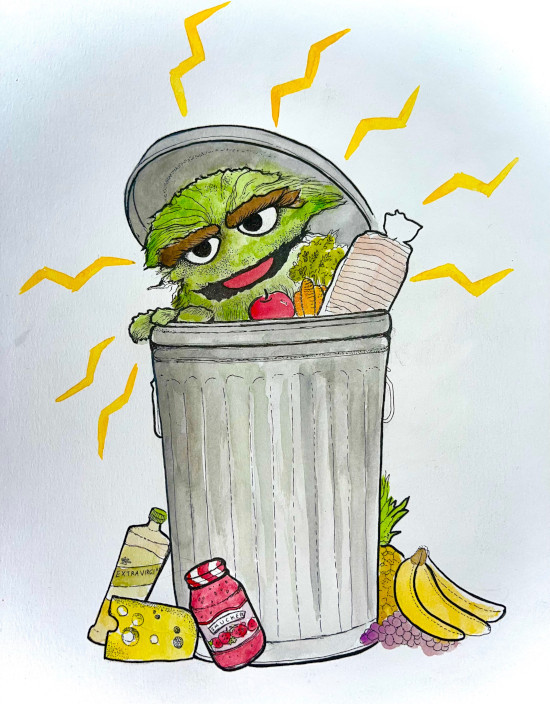Farm, table, landfill
One green city

Illustration by Gabrielle Funk
As the total at the grocery register seemingly climbs every week, many Canadians are looking to save money however they can. Buying discounted food close to its expiration date could help shoppers avoid sticker shock while even unintentionally reducing carbon emissions.
Of the 35 million tonnes of food wasted a year in Canada, grocery retailers are responsible for about 12 per cent.
When inevitably taken to the dump, unsold food breaks down and becomes methane, a gas 28 times more powerful at trapping heat than carbon dioxide. In Can- ada alone, food waste is responsible for 56.6 million tons of greenhouse gases. Globally, food waste is responsible for 6 per cent of greenhouse emissions.
One way retail stores divert food from landfills, while still making a profit, is discounting food approaching its best-before date and marketing it as something that shoppers should “enjoy tonight.”
Just a few weeks ago, Loblaw incited controversy when they rolled back their 50 per cent discount on food approaching its expiry date to 30 per cent. As inflation rises, many people, fairly, are not willing to pay full price for items that aren’t perfect. After pressure from a number of groups, the grocery chain has reinstated the original 50 per cent discount.
Tech companies are now also trying their hand at salvaging edible food from being thrown out by grocery stores. New apps like Flashfood alert users of discounted items approaching their best-before dates at their local grocery store, allowing shoppers to save money while diverting food from the landfill.
But why should the burden fall mainly on the consumer?
The City of Winnipeg has a website with tips for how individuals can decrease their carbon footprints by reducing the waste in their own fridges and pantries, yet will likely not have a curbside composting program until 2030.
Large companies have long chided individuals for their carbon footprints, a term coined by British Petroleum, while neglecting their own responsibility. If our government wants individuals to take more responsibility for their actions, they should encourage powerful corporations to do their fair share first.
In 2016, France made it illegal for grocery stores to send edible food to landfills. By law, all retailers had to donate food approaching its expiry date to charities or food banks. This policy ensures fewer families will go hungry, while also reducing the country’s carbon emissions.
According to the French Federation of Food Banks, this program prevents 46,000 tons of food from ending up in a landfill each year.
In Canada, there are no laws requiring grocery stores to divert food waste from landfills. During the cost-of-living and climate crises, what is stopping Canada from developing a similar policy? Especially when two issues can be addressed with one solution.
It’s clear from the Loblaw controversy and the increasing popularity of food-waste apps that consumers are indignant at the idea of sending edible food to the dumpster. A government that took the cost-of-living and the climate crises seriously would be doing more to address these issues, not offloading responsibility on consumers.
Allyn Lyons is based in Treaty 1. It’s pronounced uh-lyn lions.
Published in Volume 78, Number 17 of The Uniter (February 8, 2024)






